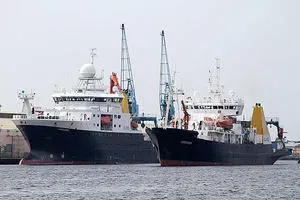
An organisation representing operators of the world’s scientific research ship fleet holds its landmark 25th annual meeting in Southampton later this month.
The International Research Ship Operators (IRSO) meeting takes place at the Southampton waterfront headquarters of the UK’s National Oceanography Centre from Wednesday 17 to Friday 19 October.
Research ships provide a platform – and a temporary home – for oceanographers and other marine scientists to work in coastal and deep sea environments, deploying a range of instruments and submersible vehicles to gather data by, for example, sampling sea water, collecting sediment cores from the seabed, measuring underwater landslides, collecting live specimens or filming fascinating features, such as underwater volcanoes. They are crewed by skilled mariners and specialist seagoing technicians, supported by a land based operations teams.
Managing ocean research fleets can present a unique set of challenges and IRSO provides a forum for managers to discuss topical issues and share information on best practice. It also offers ship operators the chance to explore opportunities for equipment exchange and to barter ship time for science expeditions. The meeting promises interesting areas for debate, as well as looking to explore more collaborative ways of working in a climate of decreasing resources.
The first IRSO meeting saw just 17 attendees from eight countries. Today, IRSO is the leading meeting for those in research ship management, with 50 different operators from 20 countries – representing over 100 of the world’s research vessels – now regularly attending. The 25th meeting has attracted delegates from Asia, Africa, North and South America, Europe, and Australia
The National Oceanography Centre (NOC), one of the founding partners of the IRSO meeting operates the UK’s deep ocean Royal Research Ships James Cook and Discovery on behalf of its owner, the Natural Environment Research Council.
In addition to the regular meeting, there will also be an industry-wide, one-day workshop supported by the Society for Maritime Industries. Its theme is keeping the research vessel fleet relevant to modern science. In a time of budgetary constraints – and to support vital research into areas, such as the oceans’ role in climate change – it is crucial that the vessels available to marine science are as reliable as possible.
Geraint West, Chair of IRSO and Head of National Marine Facilities at NOC, said “The International Research Ship Operators meeting is a great opportunity for those of us working with research vessels to come together and exchange knowledge and experience at a strategic and technical level. This is ever more important in an era of decreasing budgets, while the requirement for knowledge of the coastal seas and deep oceans and their relationship with mankind is rapidly increasing.”
There will be a great deal of work going on for the duration of the conference, but the event will also provide NOC with an opportunity to demonstrate its scientific research excellence to a global audience through tours of the facility and guest speakers from across NOC’s Directorate of Science and Technology.